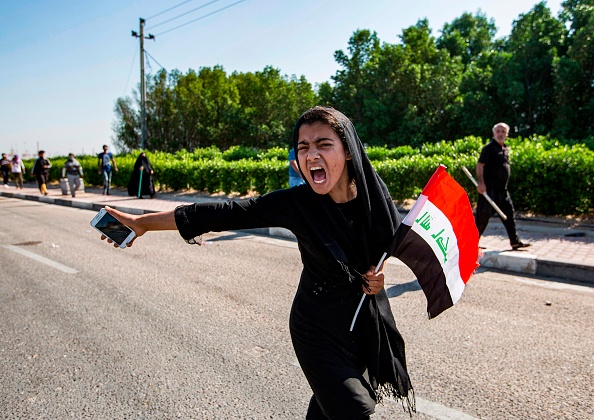Iraq protests: can the ‘bloodbath’ be stemmed?
UN urges action as more than 300 people killed in violent clashes

A free daily email with the biggest news stories of the day – and the best features from TheWeek.com
You are now subscribed
Your newsletter sign-up was successful
The United Nations has called for measures to halt ongoing violence in Iraq, following deadly clashes between security forces and anti-government activists.
As France 24 reports, mass rallies by protesters “calling for an overhaul of the ruling system” have rocked Baghdad and the Shia-majority south since the start of October. Police have responded with a brutal crackdown that has resulted in the deaths of at least 300 people, with a further 15,000 injured.
In the latest violence, three protesters were shot dead on Sunday night by security forces in the city of Nasiriyah, about 225 miles southeast of the capital.
The Week
Escape your echo chamber. Get the facts behind the news, plus analysis from multiple perspectives.

Sign up for The Week's Free Newsletters
From our morning news briefing to a weekly Good News Newsletter, get the best of The Week delivered directly to your inbox.
From our morning news briefing to a weekly Good News Newsletter, get the best of The Week delivered directly to your inbox.
So can Iraq end what Amnesty International describes as a “bloodbath”?
What is going on?
Over the past six weeks, Iraqis have been “pouring onto the streets to protest against corruption and the government’s failure to deliver basic services and economic opportunities”, says Al Jazeera.
The protesters’ demands have “widened to include the resignation of the government and a complete overhaul of the country’s political system”, which was set up by leaders in Washington following the US-led invasion in 2003, the broadcaster continues. The system is alleged to have facilitated widespread corruption that has allowed high-profile figures in Iraq to make huge monetary gains.
A free daily email with the biggest news stories of the day – and the best features from TheWeek.com
Many of the demonstrators are also believed to be angry about the increasing influence in Iraq of neighbouring Iran.
–––––––––––––––––––––––––––––––For a round-up of the most important stories from around the world - and a concise, refreshing and balanced take on the week’s news agenda - try The Week magazine. Get your first six issues for £6–––––––––––––––––––––––––––––––
The protests have been described as the “biggest threat to the power of the Iraqi political establishment since Isis was advancing on Baghdad in 2014”, reports The Independent.
The violence has escalated in recent weeks, with security forces allegedly firing live rounds into crowds at rallies. The military crackdown has reportedly been orchestrated by Iranian General Qasem Soleimani, the commander of Revolutionary Guard’s al-Quds force.
The head of the Iraqi parliament’s human rights commission told Al Jazeera that 319 people have died since 1 October.
Despite the deaths, protesters have defied attempts by security forces to shut them down, instead “organising around places such as al-Tahrir bridge, with young men and women treating the wounded and giving out water, food, hard hats and gas masks to demonstrators facing tear gas”, according to CNN.
What does the UN propose?
The UN office in Iraq (Unami) has issued a statement condemning the excessive use of force and calling for a halt to the violence.
The body is calling on Iraqi security forces to pledge to “protect the right to life”, “guarantee the right to peaceful assembly” and “practice maximum restraint in the handling of the protests, including no use of live ammunition”, and has set out a series of measures to be implemented by the authorities.
Unami says the government should release all of the demonstrators who have been detained and “accelerate efforts to identify and prosecute those responsible for using excessive force against protesters”.
The UN is also calling on “all regional and international parties not to interfere in Iraq’s internal affairs, respecting its sovereignty”, without mentioning Iran by name.
In addition, the Iraqi authorities are being urged to enact electoral reform to pave the way for elections “as soon as possible”, and to activate anti-corruption laws within the next two weeks.
That call has been echoed by the US government, which released a statement on Sunday asking “the Iraqi government to halt the violence against protesters and fulfill President [Barham] Saleh’s promise to pass electoral reform and hold early elections”.
Iraqi Prime Minister Adel Abdul Mahdi last week promised that the government and judiciary would investigate the deaths of protesters, and that all detainees who have been arrested would be released.
The 77-year-old also claimed that new electoral reforms would be announced in the “coming few days”, but failed to give any further details.